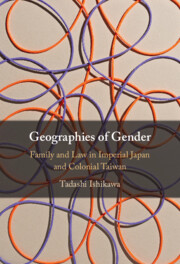Book contents
- Geographies of Gender
- Geographies of Gender
- Copyright page
- Dedication
- Contents
- Figures and Maps
- Acknowledgments
- Note on the Text
- Abbreviations
- Introduction
- 1 The Woman Question and Interwar Japan’s International Engagements
- 2 Empire Apart, Empire Together
- 3 Becoming a Taiwanese Man
- 4 When the Hearth Was at Once Warm and Cold
- 5 Freedom in a State of Flux
- 6 Stories Marginal Women Wove
- Conclusion
- Bibliography
- Index
2 - Empire Apart, Empire Together
Published online by Cambridge University Press: 09 January 2025
- Geographies of Gender
- Geographies of Gender
- Copyright page
- Dedication
- Contents
- Figures and Maps
- Acknowledgments
- Note on the Text
- Abbreviations
- Introduction
- 1 The Woman Question and Interwar Japan’s International Engagements
- 2 Empire Apart, Empire Together
- 3 Becoming a Taiwanese Man
- 4 When the Hearth Was at Once Warm and Cold
- 5 Freedom in a State of Flux
- 6 Stories Marginal Women Wove
- Conclusion
- Bibliography
- Index
Summary
When Japanese people confronted the international community in the interwar era, their concerns and ideals about the fringes of the family and marriage were aimed at not only the Japanese metropole but also its colonies like Taiwan. Metropole–colony relations were not as clear as one might expect in that there was no direct institutional connection between Japan and Taiwan regarding marriage gifts, daughter adoption, and premarital sexual relationships. However, this chapter reconstructs their discursive links and reveals how cultural critics, social workers, jurists, and others simultaneously presented their competing visions of social progress in Japan and colonial Taiwan. In Japan, progress appeared in the visions of assuming and ensuring women’s personal independence, choice, and self-awareness; in Taiwan, Japanese colonizers defined progress as incorporating women into society. Despite the hierarchical divergence of the metropolitan and colonial perspectives, however, they converged on emphasizing women’s expected behavior as members of the family and society in the 1930s. Women became the sole bearers of progress, which ultimately engendered the empire.
Keywords
- Type
- Chapter
- Information
- Geographies of GenderFamily and Law in Imperial Japan and Colonial Taiwan, pp. 77 - 114Publisher: Cambridge University PressPrint publication year: 2025

